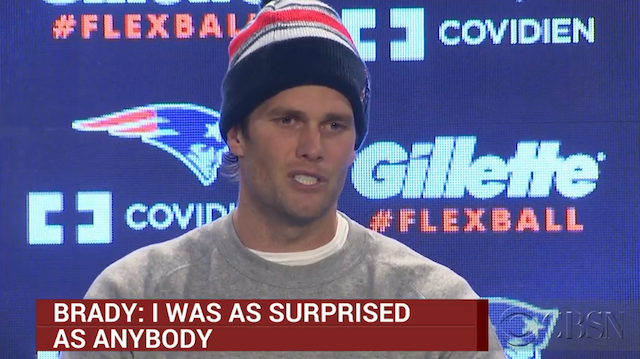
They’ll say that the cover-up was worse than the crime, and maybe they’re right.
Tom Brady and the New England Patroits denied—forcefully, indignantly—that they had deflated balls to illegally low PSIs (pounds per square inch) during last year’s playoffs, giving Brady a better grip. But yesterday’s Wells Report, an independent investigation of the controversy, concluded otherwise, saying that the Patriots deflated balls intentionally and that Tom Brady was “generally aware.”
But of course they would lie. If Brady had come forward and said, “Yup. It was me. I did it!” he likely would’ve been suspended for the Super Bowl. Whatever punishment the league doles out—a four-game suspension is the going guess—it’ll still be preferable to the league’s best quarterback sitting out the Super Bowl.
So he’ll take his punishment, complaining all the way. (His agent called the report a “significant and terrible disappointment.”)
But here’s the thing: I do believe in this case the crime was as important as the coverup but not, perhaps, for the reasons you think.
No, I don’t think Tom Brady achieved a significant edge by deflating the balls. In fact, in the second half of the AFC Championship game against the Colts, when he played with fully inflated balls, he went 9 for 9 with two touchdowns. (Although arguably it could’ve had a bigger effect on the outcome of the Divisional playoff game against the Ravens, in cold weather.)
But I do think this: The Patriots have created a culture of cheating.
They cheated when they videotaped the practices of opposing teams, so-called Spygate. They cheated when they underinflated balls. And they cheated against the Ravens, in the AFC Divisional round when they set up a formation so obscure and so designed to confuse, they fooled even the refs. What’s more, they’ve probably cheated tons of other times, gaining little edges that we don’t even know about.
Little edges here, little edges there, adding up to a whole lot of competitive advantage. Death by a thousand cheats.
But it’s not cheating if you’re smart enough to get away with it, they would argue.
Or, perhaps: Everyone does it.
Or maybe: If you’re not doing it, that’s a “you” problem.
These are the excuses of perennial cheaters, who think their dishonesty somehow makes them just a little smarter and slicker than the rest of us poor schlubs who follow the rules. But there’s honor in losing with integrity. And no honor in winning with deception.
So let’s just call it like it is: The New England Patriots are a great team. And they’re a bunch of cheaters.
